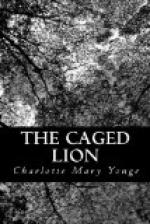When he looked back at his year of court and camp, he could only marvel at having ever preferred them. In war his want of bodily strength would make real distinction impossible; here he felt himself excelling; here was absolute enjoyment, and of a kind without drawback. Scholarship must be his true element and study: the deep universal study of the sisterhood of science that the University offered was his veritable vocation. Surely it was not without significance that the ring that shone on his finger betrothed him to Esclairmonde, the Light of the World; for though in person the maiden was never to be his own, she was the emblem to him of the pure virgin light of truth and wisdom that he would be for ever wooing, and winning only to see further lights beyond. Human nature felt a pang at the knowledge that he was bound to deliver up the ring and resign his connection with that fair and stately maiden; but the pain that had been sore at first had diminished under the sense that he stood in a post of generous trust, and that his sacrifice was the passport to her grateful esteem. He knew her to be with Lady Montagu, awaiting a vacancy at St. Katharine’s, and this would be the signal for dissolving the contract of marriage, after which his present vision was to bestow Lilias upon Patrick, make over his estates to them, take minor orders, and set forth for Italy, there to pursue those deeper studies in theology and language for which Padua and Bologna were famous. It was many months since he had heard of Lilias; but this did not give him any great uneasiness, for messengers were few, and letter-writing far from being a common practice. He had himself written at every turning-point of his life, and sent his letters when the King communicated with Scotland; but from his sister he had heard nothing.
He had lately won his first degree as Bachelor of Arts, and was descending the stair from the Hall after a Lenten meal on salt fish, when he saw below him the well-known figure of King James’s English servant, who doffing his cap held out to him a small strip of folded paper, fastened by a piece of crimson silk and the royal seal. It only bore the words:—
’To our right trusty and
well-beloved Cousin the Lord Malcolm Stewart
of Glenuskie this letter be taken.
’DEAR COUSIN,
’We greet you well, and pray
you to come to us without loss of time,
having need of you, we being a free
man and no captive.
’Yours,
’JAMES R.
‘Written at the Castle of Windsor this St. David’s Day, 1424.’
‘A free man:’ the words kept ringing in Malcolm’s ears while he hastened to obtain license from Warden John Bonke, and to take leave of Dr. Bennet. He had not left Oxford since the beginning of his residence there. Vacations were not general dispersions when ways and means of transit were so scarce and tardy, and Malcolm had been long without seeing his king. Joy on his sovereign’s




